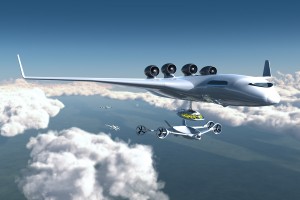
Cruiser feeder
In-flight aircraft refuelling can enable significant fuel savings and cut CO2 emissions. Recently, a series of ground-based experiments was conducted as part of the European research project RECREATE (REsearch on a CRuiser Enabled Air Transport Environment). One of the tools used for these experiments was Grace, the flight simulator of the Dutch National Aerospace Laboratory (NLR). These experiments showed that air-to-air refuelling is technically, operationally and economically viable.
Air-to-air refuelling is nothing new: it has been used in military aviation for many years. Now, a group of European universities and research institutions -including NLR- is investigating whether aerial docking and refuelling manoeuvres could also be safely and efficiently implemented into passenger flights. For this purpose, pilots from two major European airlines carried out aerial manoeuvres in the flight simulators of both NLR and DLR (the German sister organisation of NLR). The two simulators were linked up, with the DLR simulator playing the role of the tanker (‘feeder’) and the NLR simulator playing the role of the receiver aircraft. The simulation involved constant direct interaction between the two pilots.
The experiment showed that automated air-to-air refuelling can be conducted safely without overburdening the pilots. To ensure the safety of this automated flight control system, it is vital that the information about the planes’ positions is extremely accurate. For this purpose, the planes are equipped with highly sensitive sensors. The automated system used in this experiment was developed by the Munich University of Technology (TUM). Pilots can monitor the operations via the screen and switch to manual control if required. They can also watch the refuelling take place.
During the first simulator-based experiments, the pilots carried out standard manoeuvres, which were then used as a basis for adjusting the system, the on-screen information and a number of other aspects. In a second simulator session planned for mid-2014, more complex manoeuvres will be carried out.
In addition to contributing its cutting-edge knowledge and facilities to this project, NLR is also responsible for co-ordinating the EC-funded RECREATE project.
http://www.youtube.com/watch?v=cLzfIncPNxs&list=UU_dR_Pg0IUkTek7G5M2mDfA

